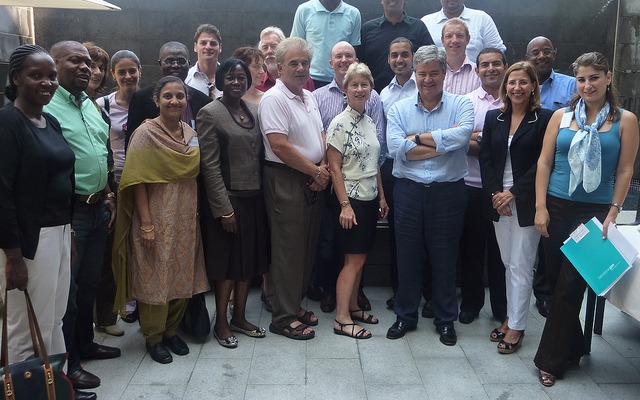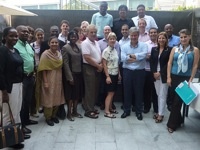community
More than 40 senior health executives gather at BSE for Global Health Leadership Forum 2010

Reporting by Dr. Fernanda Leal '10 (Economics of Science and Innovation)
The BSE hosted the seventh edition of the Global Health Leadership Forum (GHLF) from July 19-23, 2010. The GHLF is a joint initiative between the BSE, the Universidad Pompeu Fabra’s Center for Research in Health and Economics (CRES) and the UC Berkeley School of Public Health. It takes place in two intense week-long sessions, one in Barcelona and the other in Berkeley, California.
This is the second year that the GSE hosts this program. In this year's edition, the School had in its premises more than 40 senior health executives between speakers and participants. All the attendees were willing to interactively profit from their professional backgrounds and experiences with the aim of applying this knowledge in the resolution of pressing health problems they face day to day.
The program directors are internationally reknowned academics: Prof. Guillem Lopez-Casasnovas (UPF-CRES and BSE) and Prof. Steven Shortell, Prof. Richard Scheffler (Berkeley School of Public Health). Thanks to their work and international standing, the GHLF faculty included 23 internationally reknowned speakers that work in diverse health related areas such as: health economics, insurance, policy, pharmaceuticals and biotechnology. Among the speakers we had the privilege to have:
- Dr. Rafael Bengoa, minister of health and consumer affairs of the Basque government.
- Dr. Ellen Nolte, Director of Health and Healthcare of RAND Europe.
- Dr. Phillip Musgrove, (Johns Hopkins University), Deputy Editor of Health Affairs,
- Dr. Panos Kavanos, professor in International Health Policy in the Department of Social Policy and Merck Fellow in Pharmaceutical Economics al LSE Health.
- Dr. Reinhard Busse; European Observatory on Health Systems and Policies.
Speakers covered a broad range of topics. Among them, health care management priorities in their countries of origin were the focus of several sessions. Being able to listen to and question people responsible for health care management in the United Kingdom, United States, France, Spain and Germany was an invaluable opportunity for all the attendees.
All participants are experienced international health executives eager to learn about how to improve their countries' health issues in a variety of health care areas. They come from developed and developing countries such as Kenya, South Africa, Nigeria, Qatar, Saudi Arabia, India, Canada, the United States, Spain, Ghana and Israel. This fascinating mix of people fostered open and honest discussion of topics during the sessions.
The program included different activities, comprising academic seminars, and interactive practical activities such as workshops, small group sessions and fieldtrips to health facilities. During these activities, the subjects covered included complex and frontline issues, such as health systems, finance and delivery, development and performance of health systems, equality and inequallity in healthcare, pharmaceuticals, lifestyle and health, payment and insurance design, chronic care, and leadership.
Thanks to the interactive and intensive nature of the forum, our participants left having gained knowledge of important matters, such as the ideal characteristics of health system according to each country`s needs or whether a reform is a good or a bad decision. They engaged in dialogues of a socio-economic nature, with the objective of improving health care at different levels in a rational and cost-effective way. The assessment of health priorities was also explored. Additionally, problem solving regarding the supply and the demand side of health care delivery was also a matter of discussion. Developing push-forward initiatives for doctors and patients and learning from other industries were other topics discussed. A final talk in leadership assesment and how to contribute in governance completed the program schedule.
As a requisite to graduation, the GHLF program includes an individual project presentation. Participants will receive orientation and guidance from faculty in order to present this assignment. Their chosen project should be relevant of the work they do in their country and in an area of their choice. They should choose it during the first session they attend to, prepare it during the six-month period between Barcelona-Berkeley sessions and present it during the second session.
This year, participants presented projects concerning areas such as health insurance, health-care delivery, sanitary facilities, and how to solve specific concerns such as epidemics and tropical diseases.
Beside the intensive academic program, participants also enjoyed other activities. They had enough time to explore the wonderful and beautiful city of Barcelona. This year, participants had two options for touring Barcelona, a bike trip or a walking trip. They enjoyed a paella dinner by the beach and a gala dinner at the top of Montjuic’s mountain overviewing the city. Since the BSE campus and the accommodations are both situated in the Ciutadella neighborhood, and participants had free time in the evenings to explore on their own, they could choose to enjoy a relaxing view of the beach or going sight seeing in the Gothic Quarter.
The participants left very satisfied with the contents and logistics of the program. They loved the cosmopolitan city of Barcelona and the sharing of ideas and dialogue for the benefit of their countries and for the health of the world.
Berkeley’s session will take place in April 9-13, 2011.
Program Sponsors





